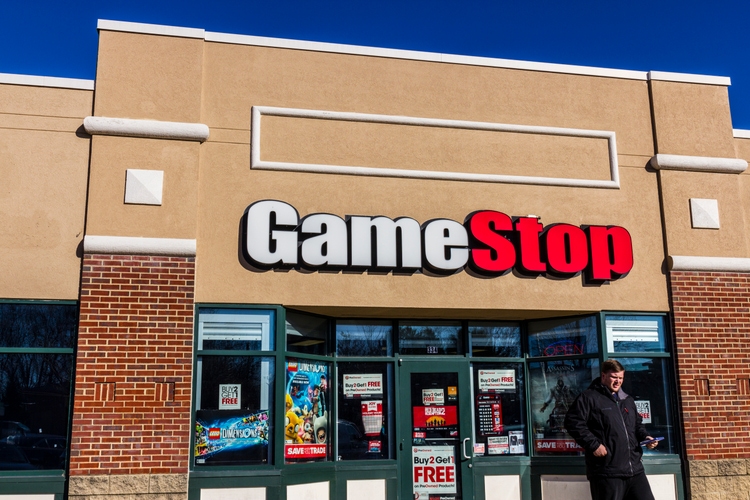Business
Wedbush Ends Coverage of GameStop, Leaving GME Without Analysts

Wedbush Securities has officially ceased its coverage of GameStop (NYSE: GME), leaving the video game retailer without any Wall Street ratings. This decision marks a significant moment for the company, which has been at the center of financial discussions and market speculation over the past few years.
Analyst Alicia Reese stated that the firm is reallocating resources, which has contributed to the decision to discontinue coverage of GameStop. In her communication, Reese noted, “We are dropping coverage on GameStop due to reallocation of resources.” This withdrawal emphasizes the ongoing challenges that GameStop faces in maintaining a consistent financial outlook.
Impact of the Decision on GameStop
With Wedbush’s exit, GameStop is left without a formal rating from any analyst on Wall Street. This shift comes as the retailer continues to navigate a rapidly changing retail environment and consumer preferences. Following the retail frenzy that propelled its stock to unprecedented heights in early 2021, GameStop has struggled to find a sustainable business model.
The company’s stock has experienced significant volatility, prompting analysts to reconsider their positions. The absence of a Wall Street rating could further complicate matters for potential investors, as they may find it harder to gauge the company’s future performance without professional analysis.
GameStop’s Ongoing Challenges
GameStop’s financial journey has been marked by intense scrutiny and speculation. Once a darling of retail investors, the company is now grappling with declining sales and shifts in consumer behavior towards digital gaming. The retailer’s efforts to pivot towards an online sales model have met with mixed results, leaving many stakeholders questioning its long-term viability.
As GameStop attempts to adapt, the lack of a sell-side analyst may hinder its ability to attract new investment. Investors often rely on analyst coverage to make informed decisions, and the absence of such guidance could lead to increased uncertainty about the company’s prospects.
In recent months, GameStop has also faced significant competition from other retailers and online platforms that have capitalized on the digital gaming trend. This increased competition has put additional pressure on the company’s traditional brick-and-mortar sales, forcing it to rethink its operational strategy.
The decision by Wedbush to step away from GameStop’s coverage reflects broader trends in the retail and gaming sectors, where rapid changes often outpace analysts’ ability to provide accurate assessments. As the company continues to redefine itself, it remains to be seen how it will navigate these turbulent waters without the backing of Wall Street analysts.
In conclusion, the withdrawal of Wedbush from GameStop’s coverage signifies a turning point for the company, as it faces ongoing challenges in a competitive landscape. Investors and stakeholders will be closely watching how GameStop adapts to these changes and whether it can regain its footing in the market.
-

 Education2 months ago
Education2 months agoBrandon University’s Failed $5 Million Project Sparks Oversight Review
-

 Lifestyle3 months ago
Lifestyle3 months agoWinnipeg Celebrates Culinary Creativity During Le Burger Week 2025
-

 Science3 months ago
Science3 months agoMicrosoft Confirms U.S. Law Overrules Canadian Data Sovereignty
-

 Health3 months ago
Health3 months agoMontreal’s Groupe Marcelle Leads Canadian Cosmetic Industry Growth
-

 Science3 months ago
Science3 months agoTech Innovator Amandipp Singh Transforms Hiring for Disabled
-

 Technology3 months ago
Technology3 months agoDragon Ball: Sparking! Zero Launching on Switch and Switch 2 This November
-

 Education3 months ago
Education3 months agoRed River College Launches New Programs to Address Industry Needs
-

 Technology3 months ago
Technology3 months agoGoogle Pixel 10 Pro Fold Specs Unveiled Ahead of Launch
-

 Technology1 month ago
Technology1 month agoDiscord Faces Serious Security Breach Affecting Millions
-

 Business2 months ago
Business2 months agoRocket Lab Reports Strong Q2 2025 Revenue Growth and Future Plans
-

 Science3 months ago
Science3 months agoChina’s Wukong Spacesuit Sets New Standard for AI in Space
-

 Education3 months ago
Education3 months agoAlberta Teachers’ Strike: Potential Impacts on Students and Families
-

 Technology3 months ago
Technology3 months agoWorld of Warcraft Players Buzz Over 19-Quest Bee Challenge
-

 Business3 months ago
Business3 months agoNew Estimates Reveal ChatGPT-5 Energy Use Could Soar
-

 Business3 months ago
Business3 months agoDawson City Residents Rally Around Buy Canadian Movement
-

 Education3 months ago
Education3 months agoNew SĆIȺNEW̱ SṮEȽIṮḴEȽ Elementary Opens in Langford for 2025/2026 Year
-

 Technology1 month ago
Technology1 month agoHuawei MatePad 12X Redefines Tablet Experience for Professionals
-

 Technology3 months ago
Technology3 months agoFuture Entertainment Launches DDoD with Gameplay Trailer Showcase
-

 Business3 months ago
Business3 months agoBNA Brewing to Open New Bowling Alley in Downtown Penticton
-

 Technology3 months ago
Technology3 months agoGlobal Launch of Ragnarok M: Classic Set for September 3, 2025
-

 Technology3 months ago
Technology3 months agoInnovative 140W GaN Travel Adapter Combines Power and Convenience
-

 Science3 months ago
Science3 months agoXi Labs Innovates with New AI Operating System Set for 2025 Launch
-

 Technology3 months ago
Technology3 months agoNew IDR01 Smart Ring Offers Advanced Sports Tracking for $169
-

 Technology3 months ago
Technology3 months agoDiscover the Relaxing Charm of Tiny Bookshop: A Cozy Gaming Escape










